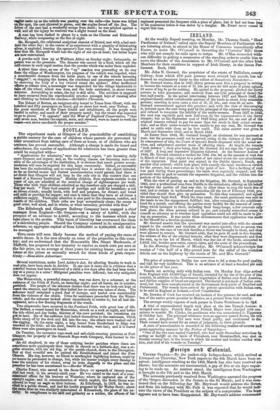SCOTLAND.
The experiment made at Glasgow of the practicability of establishing a public nursery for the care of children whose parents are prevented by their avocations from taking care of them at home or of children who are orphans, has proved successful. Although a charge is made for board and attendance, the number of applications for admission has been greater than could be complied with—, " Applications for admission," says the annual report, "are becoming daily more frequent and urgent; and, as the working classes are becoming more sen- sible of the advantages of the institution, it is obvious that much greater accom- modation will soon be required for this large community. Indeed, so successful has been the undertaking, and so completely does it answer the object intended, so far as limited means and limited accommodation would permit, that there is nd doubt that Glasgow will not long be the only city in this country that can boast of a Nursery Institution." Healthy children, from eighteen months to six rears of age, are admitted at the nominal charge of eighteenpence per week. Those who wish their children admitted as day-boarders only are charged a shil- ling per week. "Their food consists of porridge and milk for breakfast; a roll at eleven o'clock; usually broth, with beef and potatoes, for dinner.' and bread and milk or porridge for supper; and care is taken that they have at all times a sufficient supply. Particular attention is also paid to the cleanness, comfort, and health of the children. Their cribs are kept scrupulously clean; the rooms in good order, well aired, and in winter, or when necessary, provided with fires."
.The Edinburgh and Glasgow Railway Company have engaged a chief manager from England—Mr. Gregson—,at a. salary of 3,0001., with the prospect of an advance to 4,0001., according to the increase which may take place in the profits. This burst of liberality has overturned the ideas of a calculating people. Should the Company succeed in its amalgamation schemes, an aggregate capital of from 5,000,0001. to 6,000,0001. will fall to be managed.
'Corn-rents will soon likely become the method of paying the rents of arable farms. It is the case already on some of the properties in this coun- try; and we understand that the Honourable Hrs. Stuart Mackenzie, of Seaforth, has proposed to her tenantry to receive so much corn per acre at the fair price, on an average of three years for existing leases; and on new leases at the prices as annually struck for these kinds of grain respec- tiyely.—Ross-skire Advertiser.
.Several convictions under Lord Ashley's Act, for allowing females to work in coal-pits, have been 'Lade in Airdrie. In one case it came out in evidence that a married woman had been delivered of a child a few days after she had been work- ing at a pump in a mine ! Mitigated penalties were inflicted; but why mitigated does not appear.
The Waterwitch, a powerful steam-tug, was run down by a schooner, at the entrance of the Frith of Forth, on Saturday night; and all hands, six in number, perished. The people of the schooner declare that there was no look-out kept on board the steamer, and though they hailed her no notice was taken of them. The schooner itself sustained a good deal of damage' and heeled over considerably from the violence of the shock. Cries for assistance proceeded from the Water- witch; and the schooner tacked about immediately to render it; but all had dis- appeared, save a few floating fragments of the wreck.
Two shipwrecks have occurred in the Pentland Frith, with great loss of life. The Belfast, a vessel bound for Montevideo, struck on a rock at night, and before the tide ebbed and day broke, thirteen of the crew perished; the remaining six got to land. Six of the sufferers had lashed themselves to the mainmast, which broke sharp off by the deck and fell into the sea; the others were washed out of the rigging. On the same night, a brig bound from Sunderland to Sligo was wrecked in the frith: all the crew, twelve in number, were lost; and it is feared there were also passengers on board.
On Tuesday, the extensive rope-work and sail-cloth-weaving premises at Port Glasgow, the property of the Gourock Rope-work Company, were burned to the ground.
An old shepherd, in one of those outlying border parishes where there are sometimes more quadrupeds than bipeds in church on a Sabbath-day, was a re- gular attender, with his old dog, at the parish-church, down to the Disruption. But at that eventful sem he quitted the Establishment and joined the Free Church. His dog, however, no friend to newfangled highflying notions, could by no means be persuaded to change, but, while his master trudges every Sunday to hear the minister of his choice, away he trots doggedly to the place and the preacher he has been accustomed to.—Border Watch.
Charles Ewart, who served in the Scots Greys or upwards of twenty years, died last week, in his seventy-ninth year. He was raised to the rank of a com- missioned officer for his bravery at Waterloo; where he captured one of the enemy's eagles; and in commemoration of which exploit, the Scots Greys were allowed to wear an eagle on their buttons. At Edinburgh, in 1816, he was in- vited to a public dinner, and had his health proposed by Sir Walter Scott: about the same time he was similarly entertained at 'amocir., the place of his na- tivity. In compliment to his skill and gallantry as a soldier, the officers of his regiment presented the Sergeant with a piece of plate; but it had not been long in his possession before it was stolen by a burglar. Mr. Ewart never ceased to regret this loss.


























 Previous page
Previous page